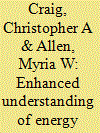| Srl | Item |
| 1 |
ID:
127903


|
|
|
|
|
| Publication |
2014.
|
| Summary/Abstract |
This study explores factors related to energy consumers' perceptions of government subsidies for utility provided energy efficiency (EE) programs and for utility providers' use of more clean/alternative energy sources. Demographic factors, attitudes, planned purchases, and perceptions of utility provider motives in relation to governmental and utility provider EE initiatives (i.e. providing discounts and coupons for CFL bulbs), plus the influence of gain- and loss-framed messages are investigated. Over 2000 respondents completed a 16 item phone survey. Hierarchical regression explained 38% of the variance in reactions regarding government subsidies of the cost of utility provided EE programs and 43% of the variance in perceptions involving whether utility companies should use of more clean or alternative forms of energy. Gender and party differences emerged. Loss-framed messages were more important when the issue was government subsidies. Both gain- and loss-framed messages were important when clean/alternative energy was the issue.
|
|
|
|
|
|
|
|
|
|
|
|
|
|
|
|
| 2 |
ID:
150874


|
|
|
|
|
| Summary/Abstract |
A comprehensive survey is carried out in Kendu Bay area of Kenya to determine electrification patterns of a typical rural sub-Saharan Africa community and to determine the reasons behind such energy choices. The data from the survey is used to build a transition probability matrix (TPM) for different electrification states for Kendu Bay households. The TPM and the survey data are used to model temporal diffusion of PV systems and PV-based communal (mini/micro) grids in the area. Survey data show that majority of Kendu Bay residents shun the national grid due to high connection fees, unreliability of the system, and corruption; people who can afford-to choose small solar home systems for their basic electricity needs. Without any government policy intervention or help, simulation results show that once 100% electrification status has been achieved in Kendu Bay, only 26% of the residents will be found to be electrified through the national grid alone; the majority (38%) will be electrified through PV-based communal grids while the remaining 36% will be electrified through grid connected PV home systems (26%) or grid connected communal grids (10%).
|
|
|
|
|
|
|
|
|
|
|
|
|
|
|
|
| 3 |
ID:
191344


|
|
|
|
|
| Summary/Abstract |
Attitudes towards renewable technologies and knowledge about energy consumption influences the adoption of sustainable energy systems across power, heat and transport. Research suggests that behavioural change strategies could accelerate the transition towards net-zero by reducing household energy consumption, increasing the uptake of energy efficient technologies and optimising consumption patterns. In tandem, emerging markets and business models facilitated by energy decentralisation and digitalisation give consumers more control over their home energy management and adopt more energy efficient behaviours. This empirical study seeks to determine the level of awareness of domestic consumers on the island of Ireland, which makes for an interesting case study due to the existence of a single electricity market with a dichotomic regulatory regime. This survey is critical to engineers, industry and other stakeholders in understanding the implications of climate policy aspirations and targets as society transitions towards carbon neutrality. A questionnaire was issued to a sample of 1,373 respondents in March 2022, facilitated by a third-party survey provider. The questionnaire had 40 questions composed of multiple-choice and single-answer format; questions covered participants’ sociodemographic attributes, their willingness to adopt new technologies and services and their eco-credentials. The results identify the strengths, weaknesses and opportunities for householders to adopt more efficient household energy behaviours and attitudes towards smart energy technology and their carbon footprint. This study explores the emerging, yet significant role of domestic consumers in an equitable transition to a sustainable future.
|
|
|
|
|
|
|
|
|
|
|
|
|
|
|
|